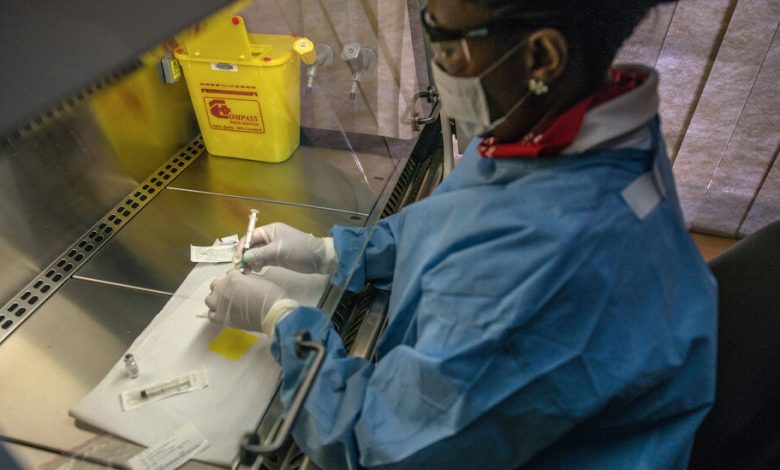The Only H.I.V. Vaccine in Advanced Trials Has Failed. What Now?

The only vaccine against H.I.V. still being tested in late-stage clinical trials has proved ineffective, its manufacturer announced on Wednesday, another disappointment in a field long beset by failure.
Dozens of H.I.V. vaccine candidates have been tested and discarded over the past few decades. The latest defeat sets progress toward a vaccine back by three to five years, experts said. Still, other options in early-stage trials may yet turn out to provide a powerful bulwark against H.I.V., the virus that causes AIDS.
The news is “disappointing, but it isn’t the end of the effort toward developing a vaccine,” Dr. Anthony S. Fauci, who led the National Institute of Allergy and Infectious Diseases until December, said in an interview. “There are other strategic approaches.”
An ongoing study called PrEPVacc in Eastern and Southern Africa is evaluating a combination of experimental H.I.V. vaccines and preventive drugs. Scientists have made headway in developing powerful antibodies that can neutralize the virus. And they are testing new vaccine technologies, including mRNA, against H.I.V.
Still, the loss of the latest candidate underscores the challenges of designing a vaccine for an adversary as wily as H.I.V. Four decades after its discovery, the virus still infects about 1.5 million people each year, and kills about 650,000.
The Fight Against H.I.V.
An estimated 40 million people are living with H.I.V. worldwide. About 10 million of them do not have access to treatment.
- A New Shot: An injection every two months rather than a daily pill could shield many more women from H.I.V., but the shot is unavailable in places that need it most.
- Pandemic Setbacks: Before Covid-19, the world had been making strides against global illnesses like H.I.V. The pandemic has changed that for the worse.
- Left Behind: Sub-Saharan Africa has made steady progress in delivering lifesaving medication to adults. But young patients are harder to reach.
- A Promising Treatment: In 2022, researchers announced that a woman became the third person ever to be cured of H.I.V. thanks to a new transplant method that could help more people from racially diverse backgrounds.
For people in wealthier nations, H.I.V. is not the death sentence it once was. Powerful drugs can suppress the virus in infected individuals. There are several options available to prevent infection: Oral pills and shots given every two months are already approved in the United States, for example, and a shot that would only need to be given every six months is in late-stage trials.
But these medications must be taken for the rest of the patient’s life, and are often inaccessible to those who need them the most. A vaccine would be the ideal way to thwart the virus.
“The ultimate prevention modality for any infection, particularly viral infection, is a vaccine that’s safe and effective,” Dr. Fauci said. “That’s the reason why the field is going to continue to pursue very active research in that area.”
The trial now ending, called Mosaico, began in 2019 and was led by Janssen Pharmaceuticals, part of Johnson & Johnson. It tested the vaccine in 3,900 cisgender men (those who have always identified as male) and transgender individuals who have sex with cisgender men and transgender individuals, in more than 50 sites in nine countries in North America, South America and in Europe.
The vaccine contained a mosaic of components meant to target several different subtypes of H.I.V. present worldwide. But the immune response it provoked against the virus did not include significant amounts of the so-called neutralizing antibodies that are considered the most powerful weapons against infection.
While the trial’s failure does not spell the end of the mosaic approach, it does signal that a successful vaccine should rouse the body to produce broadly neutralizing antibodies, Dr. Fauci said.
After reviewing early data from the trial, an independent data and safety monitoring board concluded that while the vaccine was safe, it did not prevent more H.I.V. infections than a placebo did. The board recommended that the company stop the trial and inform the participants.
The outcome did not entirely surprise experts, because a study of the same vaccine, called Imbokodo, was halted in 2021. That trial tested the vaccine in cisgender women in five sub-Saharan African countries.
The failure of the studies is particularly disappointing partly because they were funded by Johnson & Johnson, said Mitchell Warren, executive director of the H.I.V. prevention organization AVAC.
“Not that many companies get involved in infectious disease vaccines, so to see this not getting to market is a disappointment and a setback,” Mr. Warren said.
The news should prompt policymakers and activists to think of ways to make the existing tools for preventing H.I.V. more widely accessible, he added: “It’s not that all hope is lost, it’s that we need to redirect our resources to greatest impact.”
